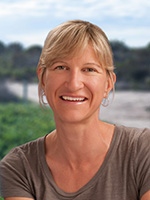
Carolyn Kurle, Ph.D.

- Project Description
- Community Partners
- Profile
Project Description
“A delegation of UC San Diego students will participate in a service-learning trip to Iceland (a community experiencing the impacts of climate change today) and culminate in climate change and carbon neutrality education and outreach. The trip will consist of 50% science major and 50% non-science major students. First generation college students will receive priority acceptance into the program.
In Iceland, “The 300-some glaciers that cover more than 10 percent of the island are losing an average of 11 billion tons of ice a year.” (http://www.climatecentral.org/news/icelands-vanishing-ice-16847). Greenhouse Gas Emissions produced around the world are having a noticeable impact on the daily experiences of people living in Iceland. Their farms, tourism trade, businesses, and cultural practices are all being directly affected by choices about transportation and energy use in the United States and other countries.
This is also an important location for research tracking the impact of climate change and its effect on our planet because there are many aquatic environments where students could collect data, see the effects of climate change, learn about alternative geothermal energy technology, and collect meaningful scientific data that could be applied to better understanding the role of climate change. Students on the Iceland trip will work closely with Dr. Carolyn Kurle of UC San Diego and partners at Holar University College in Iceland to engage in meaningful research, collecting data from organic matter and learning to analyze it for stable isotopes to track the rate of climate change and how it is affecting the food web and the larger ecological system. With Dr. Kurle, students could use the data to write a manuscript publishable in a scientific journal on which all involved students would be co-authors. During the trip, students will also meet with non-profit organizations and community leaders to hear their experiences living with climate change and what actions the community is taking to address the issue.
The students who participated in the trip be encouraged to implement the developed communications strategy, providing outreach to at least 100 members. Examples of outreach could include screenings of the documentary developed on the trip, social media campaigns, podcasts, blogs, development of educational materials, dialogue sessions, etc.
Students will be building critical skills around communicating science to the public and will also have an opportunity to impress upon their colleagues and the campus community the urgency of climate change.”